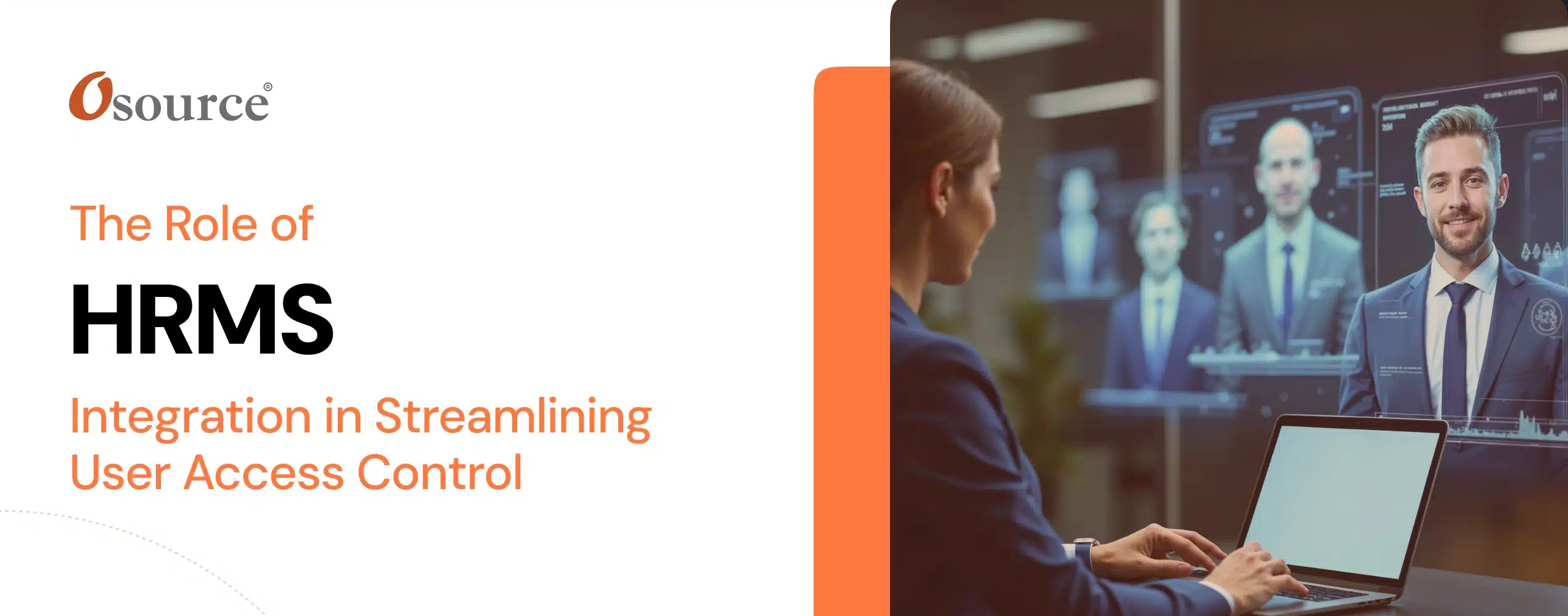
Team Osource
October 14, 2024How to streamline HR Processes with an integrated HR Management System
Introduction
A growing business depends on its people. But as teams expand, managing human resources becomes exponentially complex. Manual payroll errors, compliance risks, fragmented employee data, and outdated performance reviews quietly drain time and resources.
An effective HR management system transforms how HR teams operate not just by automating routine tasks, but also by enabling smarter, data-driven workforce decisions.
This article explores the hidden costs of inefficient HR processes, how integrated HRMS platforms improve the employee experience, and how Onex HRMS helps growing businesses manage their workforce with confidence and clarity.
The Hidden Costs of Inefficient HR Management Systems
Managing HR with manual processes and disconnected systems comes with hidden costs that compound over time. These inefficiencies quietly erode productivity, increase risk, and limit a company’s ability to scale. Here are three critical areas where outdated HR workflows create operational drag:
- The high cost of manual workflows: Processing payroll, managing leave, and tracking attendance through spreadsheets or siloed systems is slow, error-prone, and resource-intensive. When HR teams spend hours reconciling data and correcting mistakes, strategic work — like talent development or culture initiatives — falls to the bottom of the priority list. Over time, these inefficiencies impact employee trust and business agility.
- Compliance risks: Labor laws, tax regulations, and reporting standards evolve constantly. Manual calculations and fragmented data management increase the risk of compliance errors — which can result in financial penalties and damage to reputation. A missed overtime calculation or late tax filing can cost far more than the price of adopting an automated solution.
- Data security and fragmentation: When employee data lives across multiple systems, spreadsheets, and email threads, maintaining security and accuracy becomes difficult. Sensitive information — from compensation details to personal records — is exposed to greater risk of error or breach. Consolidating this data within a unified, secure HR management system reduces these risks and ensures data integrity across the employee lifecycle.
Inefficient HR processes aren’t just an operational headache — they create real business risk. Addressing these gaps is a strategic priority for companies that want to scale effectively and maintain compliance in an increasingly complex landscape.
How an HR Management System elevates the employee experience
An effective HR management system does more than streamline internal HR operations — it transforms the employee experience across the entire lifecycle, from onboarding to exit.
- Self-service and empowerment: Integrated hr software programs give employees direct access to important HR functions. Through a secure, cloud-based portal, employees can view payslips, request leave, update personal information, and manage benefits — all without waiting on HR intervention. This self-service model enhances autonomy, reduces administrative friction, and fosters a more transparent workplace
. - Personalized development and feedback: Beyond basic tasks, advanced hr software companies are embedding AI-driven tools that personalize the employee experience. Onex HRMS, for example, enables employees to track their career progression, receive tailored feedback, and access learning opportunities aligned to their goals. This fosters continuous engagement and helps organizations nurture a high-performing workforce.
- Building trust through accuracy and transparency: When payroll errors or compliance issues arise, employee trust quickly erodes. An integrated system ensures accurate, timely payroll and compliance management — giving employees confidence in the organization’s processes. Features such as transparent performance tracking and real-time feedback loops further enhance trust and alignment between employees and management.
In short, an integrated HRMS not only improves operational efficiency — it plays a critical role in enhancing employee satisfaction, engagement, and retention. In a competitive talent market, this can be a powerful differentiator.
How HRMS supports business expansion
As organizations grow, HR complexity scales rapidly. Managing larger, more diverse teams across multiple locations introduces new challenges — manual processes and disconnected systems simply can’t keep pace. This is where an integrated HR management system becomes a strategic enabler of business expansion.
Scaling without added complexity: For growing companies, hiring more employees often means adding more HR processes — unless those processes are automated. Onex HRMS streamlines core functions such as payroll, compliance, performance management, and onboarding, allowing HR teams to manage increasing volumes without sacrificing accuracy or efficiency.
Supporting remote and hybrid workforces: In today’s flexible work environment, organizations must support employees across various locations and time zones. Cloud-based solutions like Onex HRMS ensure that HR data is centralized, secure, and accessible from anywhere. A modern hr cloud system enables seamless coordination across distributed teams, ensuring consistent processes and real-time insights regardless of geography.
Enabling strategic workforce planning: As business needs evolve, HR teams must plan proactively. The best HR systems provide predictive analytics and reporting tools that help leaders forecast hiring needs, manage talent pipelines, and align HR strategies with business objectives. This turns HR from an administrative function into a strategic driver of growth.
Key features of Onex HRMS
Choosing the right HR management system means looking beyond automation to how the platform supports real business outcomes. Onex HRMS offers a comprehensive set of features designed to simplify HR operations and help organizations manage their workforce more strategically.
- Employee life cycle management: From recruitment to retirement, Onex HRMS provides seamless management of the entire employee journey. Automated onboarding ensures new hires are productive from day one, while offboarding workflows support compliance and knowledge transfer when employees exit.
- Payroll automation: Payroll accuracy is critical for employee trust and compliance. Onex HRMS integrates powerful payroll automation capabilities, rivaling those of leading payroll software companies. Real-time tax updates, error-free calculations, and automated reporting ensure payroll runs smoothly across all jurisdictions.
- Recruitment and onboarding: AI-driven recruitment tools help HR teams source the best talent efficiently. Automated resume screening, intelligent candidate matching, and digital onboarding reduce time-to-hire and improve new hire experience.
- Performance and analytics: With built-in performance tracking, Onex HRMS enables transparent goal setting, continuous feedback, and data-driven performance reviews. Advanced reporting tools provide actionable insights into workforce trends and productivity.
- Workforce planning: Strategic workforce planning is essential for scaling. Onex HRMS provides predictive analytics that help HR leaders forecast staffing needs and model different growth scenarios — transforming HR into a proactive business partner.
- Cloud integration and rapid deployment: As modern hr system software, Onex HRMS is cloud-based, offering secure, anytime-anywhere access. Its rapid deployment minimizes disruption, allowing organizations to realize value quickly.
In short, Onex HRMS delivers a robust, flexible platform that helps HR teams operate more efficiently while supporting broader business goals — making it a smart investment for companies focused on growth and agility.
How industries are leveraging Onex HRMS
While the core principles of effective HR management are universal, different industries face unique HR challenges. Onex HRMS provides flexible tools and industry-specific capabilities that help organizations tailor their HR processes to meet these needs.
-
Telecom
Telecom companies often manage large, geographically dispersed teams with complex shift patterns and regulatory requirements. Onex HRMS helps streamline payroll and compliance across multiple regions, ensuring accurate calculations aligned to local labor laws. The system also simplifies attendance tracking for field-based employees using location-aware tools.
-
Healthcare
In the healthcare sector, managing dynamic shift scheduling, certifications, and compliance is critical. Onex HRMS automates these processes, reducing manual errors and freeing HR teams to focus on staff wellbeing and engagement. Real-time visibility into workforce availability helps ensure optimal staffing across departments.
-
Pharmaceuticals
Pharmaceutical companies operate in highly regulated environments with stringent compliance standards. Onex HRMS centralizes employee data and automates compliance reporting, reducing the risk of errors and penalties. The system also supports detailed training tracking, ensuring employees maintain required certifications.
-
Other industries
From logistics to media to manufacturing, businesses are using Onex HRMS to streamline HR processes and drive workforce efficiency. The platform’s flexibility allows it to adapt to diverse operational models, making it one of the best HR software solutions for organizations seeking to standardize and optimize their HR functions.
By delivering industry-specific value, Onex HRMS helps organizations move beyond generic HR processes — empowering them to manage their workforce more effectively and with greater confidence.
Conclusion
As this article has explored, the true value of an integrated HR management system lies in its ability to simplify complex HR operations, enhance the employee experience, and support business growth. From automating payroll and compliance to enabling intelligent workforce planning and global scalability, platforms like Onex HRMS empower organizations to manage their most valuable asset — their people — with greater efficiency and confidence.
In a business environment where agility and talent retention are critical, investing in the right HR technology is no longer optional. Forward-thinking companies are adopting solutions that not only meet today’s needs but also position them for future success.
If your organization is exploring ways to streamline HR processes and unlock new levels of operational performance, Onex HRMS offers a comprehensive, flexible platform designed to help you achieve these goals.
To learn more about how Onex HRMS can support your workforce strategy, we invite you to explore the platform in more detail or schedule a personalized demo.



